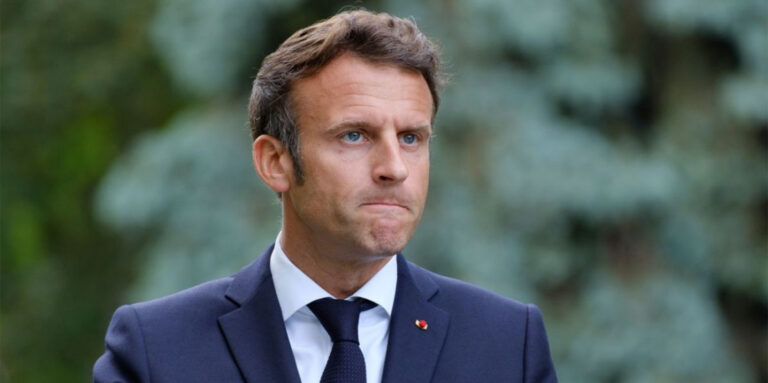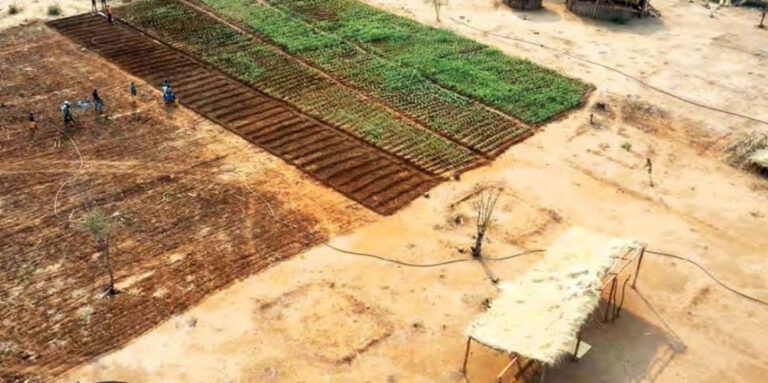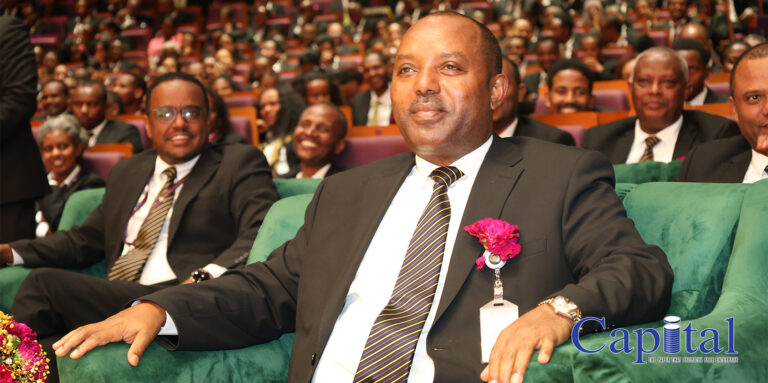The Commercial Bank of Ethiopia (CBE), the country’s financial powerhouse, has established a new tradition called “The New Year with Our President.” Launched last year, this event serves as an annual address from the bank’s leadership to its extensive workforce.
This year’s celebration took place on September 18, one week after the Ethiopian New Year on September 11. The event provided President Abie Sano, a prominent figure in the financial sector, with a platform to connect with representatives of his over 70,000 employees. He used this opportunity to share his experiences, discuss the bank’s current status, and outline its future strategy.
President Abie expressed a strong desire to share personal anecdotes as lessons for young professionals. However, time constraints during the ceremony, held in the large hall of the headquarters, limited this interaction.
In his speech, he reflected on the challenges he has encountered during his two terms of leadership. He continues to lead a significant reform initiative at CBE, supported by international partners and active government involvement. This support includes a new capital injection and the resolution of outstanding debts from public enterprises.
During his hour-long address, President Abie commended the bank’s promising performance over the past year, marking a notable improvement from previous years that faced various external and internal challenges. While he acknowledged these achievements, he also addressed areas needing immediate attention to ensure optimal performance and regain lost customers.
The President emphasized his expectation for employees to enhance their efforts and rejuvenate CBE’s esteemed work ethic and culture, which has been cultivated over decades. He firmly stated, “We must eliminate any employee whose behavior tarnishes our image.”
Addressing the packed hall, President Abie reiterated CBE’s vision: “to become a world-class commercial bank that financially drives Ethiopia’s future.” He emphasized that achieving this goal requires additional effort beyond regular working hours. “This vision will be realized when we engage in effective financial intermediation in society,” he stated, adding, “We must aggressively expand resource mobilization.”
He highlighted the collection of 515 billion birr in deposits during the last financial year as the foundation of all operations—a success that must be vigorously sustained.
President Abie reminded the audience that CBE, once a small bank, now finances every major project in the country and is highly regarded for its contributions. He reflected on the bank’s founding in 1942, following independence from fascist Italy, with the goal of ensuring the nation’s economic self-sufficiency. “This is why the bank has supported every social, economic, and development initiative in the country,” he noted.
Moreover, CBE has played a pivotal role in shaping the current private banking sector by providing expert personnel and facilitating financing. Its contributions to financial inclusion, branch expansion, and financial literacy have been significant. “Most enterprises and private companies were established with the support of CBE,” he concluded, underscoring the bank’s foundational role in Ethiopia’s economy.
Leading a Financial Giant Through Crisis
Abie has twice taken the helm of the Commercial Bank of Ethiopia, the country’s largest financial institution, during critical periods of turmoil.
His first appointment as president came in January 2006, following the tragic suicide of his predecessor, Gezahegn Yilma. At just 34 years old, Abie’s selection surprised industry experts, making him the youngest president in the bank’s history. At that time, CBE’s assets were under 30 billion birr, and the institution faced significant challenges.
Experts noted the unusual nature of his appointment due to his youth compared to previous presidents. “He was the youngest bank president ever, taking the post at the age of 34,” CBE leadership told Capital. The bank was in dire straits, and the government had even considered outsourcing its management to external firms to address its difficulties.
Consultancy firms, including the Bank of Scotland, were engaged to enhance management, KPMG was hired for a comprehensive audit, and the BPR scheme was implemented to provide assistance. However, these initiatives did not yield the desired outcomes.
The government sought a new management team through an outsourcing arrangement, eventually negotiating with the State Bank of India (SBI), which ultimately fell through. In the early 2000s, SBI had discussed managing CBE for three to five years.
“The deal with SBI failed when the Indian bank discovered that CBE’s non-performing loan (NPL) ratio was extraordinarily high,” Abie recalled. “When I took over, the NPLs had reached 59 percent, a level that SBI deemed unmanageable. They expressed that it was impossible to fix the bank, considering it effectively bankrupt. They had never encountered a financial institution with over 50 percent NPLs and advised that only someone with in-depth local knowledge could provide a solution.”
He explained to his staff that his experience in the credit department was a key factor in his appointment at such a young age. “Through a combination of luck and hard work with my management team, we significantly reduced the NPLs,” he stated.
By the time he left the position in November 2008, CBE’s NPL ratio had fallen to 4.5 percent, aligning with the regulatory standard of 5 percent. Abie’s management team was credited with achieving these results within just a year and a half of his appointment.
“I was removed from my position when I resisted a government program that I believed would jeopardize the bank, which was still struggling to recover from the previous crisis,” he recalled.
After leaving CBE, he served as the founding president of Oromia Bank until the government called on him again to rescue his former employer, where he began his career after graduating from Addis Ababa University with a BA in Accounting.
“When I returned to CBE in March 2020, we were facing the same issues. All public-sector credits were non-performing or not being repaid, the non-performing loan (NPL) ratio for private customers was 20 percent, and the liquidity ratio stood at 9.4 percent—well below the regulatory minimum of 15 percent,” he said. “Additionally, there were complex challenges, including foreign currency issues, when I was reassigned in 2020.”
“Our immediate priority was to address the liquidity crisis, followed by a comprehensive review, assisted by consultants, to realign the bank’s mission.”
This review uncovered several critical problems: service quality had significantly declined, resulting in a loss of competitive edge and market share for the bank. Employee productivity was low, with 92 percent of branches operating at a loss. A high cost-to-income ratio of 88 percent also posed a major challenge.
Most public-sector credits, which accounted for over 90 percent of the total outstanding loan portfolio, had not been repaid for up to 20 years. “Surprisingly, despite regulatory requirements, 75 percent of the private sector credit portfolio consisted of long-term loans,” he noted. “While long-term credit for public enterprises is acceptable, the central bank’s regulations permit financial institutions to allocate only 20 percent of their credit as long-term loans to the private sector. At CBE, it was 75 percent.” In many instances, private sector credit was concealed within public loan portfolios.
According to the president, the most significant achievement of the past budget year was not the progress in deposit mobilization but the government’s commitment to repaying the 945 billion birr in credit extended to public enterprises. “I would like to thank the government for heeding my advice on this matter,” he said, commending the decision to allocate a budget each year to settle public enterprise debt at CBE as part of a broader macroeconomic reform.
The review also revealed considerable customer complaints, which have seen some improvement locally but remain high among the diaspora community. “During my latest overseas trip, I noticed that we need to enhance our services for the diaspora,” he added.
Technological lag was another serious issue affecting the bank when he assumed leadership five years ago. “We have gradually gotten back on track. For the first time in the last budget year, we are not only maintaining our position but also reclaiming the market share we lost,” he said. “In the past year, we regained our market share in four key performance indicators. We have demonstrated that it is possible to reclaim our market, and we must continue on this path.”
Moreover, over 50 percent of branches have become economically profitable. “It’s a miracle,” he noted as a significant success achieved in the past year.
Key Priorities for the Year
In a recent address to employees, President Abie emphasized that exceptional customer care must be the highest priority for all staff this year.
“We must enhance both our service and the customer experience,” Abie stated.
He highlighted the urgent need to improve the workplace culture and behavior observed among some staff, noting, “There are disengaged individuals within our company, and we must address these work habits.” He also identified attitude as a critical area needing improvement, pointing out that many employees display behavior that is unacceptable to management and inconsistent with the values and culture of the Commercial Bank of Ethiopia (CBE).
The President emphasized, “Our behavior must align with the bank’s mission and standards. Respect for customers, colleagues, and leaders is non-negotiable and essential for us to reclaim our success.”
Another central theme was fostering a stronger sense of ownership among employees. Abie highlighted a significant gap in how employees perceive their stake in the bank.
“As its name suggests, this is the Commercial Bank of Ethiopia—it is ours. We own this company, and we must actively protect its image,” he advised. “No Ethiopian leader has ever taken CBE with them. Many presidents have managed the bank, but none have derived personal ownership benefits from their position. While we may have personal disagreements with individuals, there is no justification for harboring negativity towards CBE. This institution is our shared asset and our children’s legacy. Therefore, we must enhance our sense of ownership.”
He cited other public enterprises where employees demonstrate strong ownership, asserting, “I would argue that no other institution offers benefits as substantial as CBE.”
Regarding performance, the President acknowledged that CBE does not lead in all Key Performance Indicators (KPIs), stating that improvements in these areas are crucial for boosting profitability. He specifically identified foreign currency mobilization as a key area needing correction to maximize profits.
Ambitious Outreach and Financial Targets
Reiterating the bank’s core mission, Abie stated, “We must provide finance for the Ethiopian people.” Currently serving 200,000 borrowers, the goal is to expand this reach to between 5 and 10 million households.
To achieve this, CBE has set ambitious targets:
• Mobilize 750 billion Birr in fresh loans by the end of June 2026, a significant increase from the 515 billion Birr target for 2024/25 and 120 billion Birr the previous year.
• Provide loans to 100,000 new customers by June 2026.
• Generate up to 6 billion dollars in foreign currency, a considerable rise from the approximately 4 billion dollars earned the previous year.
Abie has frequently highlighted a pattern of misdemeanors that have negatively impacted the bank’s public image. Senior bank experts confirmed that various misdemeanors have affected the bank over the years.
“This was a key reason for the president’s focus on the issue,” they told Capital, explaining the leadership’s attention to the matter.
They added, “Staff honesty and adherence to professional obligations have been particular challenges observed in some employees. However, this is now improving significantly.”
“Since the case received prudent attention from leadership, substantial changes have been implemented,” the experts stated.
A risk expert elaborated on these changes: “For instance, to combat internal fraud, we have introduced account masking, which restricts full customer account access to branch managers only. We have also installed several technology-backed systems to safeguard customer data and transactions.” The expert emphasized that the state-owned financial firm has a zero-tolerance policy toward behavioral issues.
“We have taken extensive administrative action, terminating a significant number of employees and pursuing legal measures against them,” they said.
The bank is also providing staff with awareness training and skill development programs to uphold its professional reputation.
“Employee conduct has been one of the challenges affecting our public image, but it is now being restored,” they concluded.






